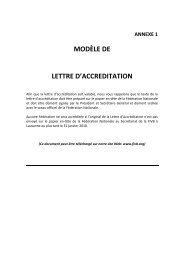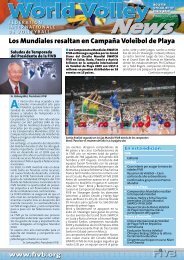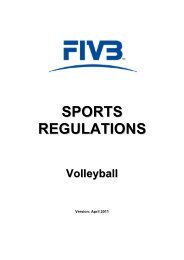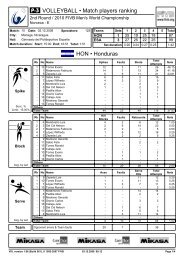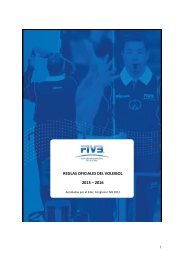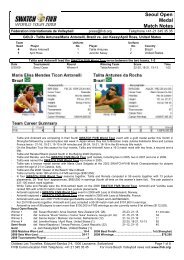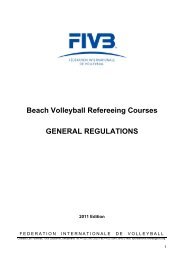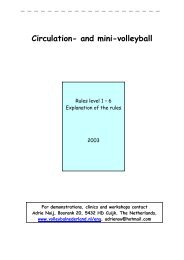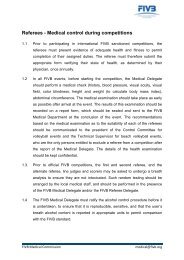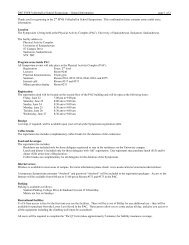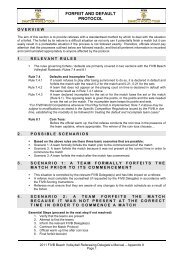MEDICAL REGULATIONS 11 Edition - FIVB
MEDICAL REGULATIONS 11 Edition - FIVB
MEDICAL REGULATIONS 11 Edition - FIVB
You also want an ePaper? Increase the reach of your titles
YUMPU automatically turns print PDFs into web optimized ePapers that Google loves.
<strong>FIVB</strong> Medical Regulations – <strong>11</strong>th <strong>Edition</strong><br />
INTRODUCTION<br />
A. ANTI-DOPING RULES<br />
Preface<br />
At the <strong>FIVB</strong> Congress held on 16-17 June 2008 in Dubai, the <strong>FIVB</strong> accepted the revised<br />
(2009) World Anti-Doping Code (the "Code"). These Anti-Doping Rules are adopted and<br />
implemented in conformance with <strong>FIVB</strong>'s responsibilities under the Code, and are in<br />
furtherance of <strong>FIVB</strong>'s continuing efforts to maintain volleyball as a doping-free sport.<br />
Anti-Doping Rules, like Competition rules, are sport rules governing the conditions under<br />
which sport is played. Athletes and other Persons accept these rules as a condition of<br />
participation and shall be bound by them. These sport-specific rules and procedures,<br />
aimed at enforcing anti-doping principles in a global and harmonized manner, are distinct<br />
in nature and, therefore, not intended to be subject to, or limited by any national<br />
requirements and legal standards applicable to criminal proceedings or employment<br />
matters. When reviewing the facts and the law of a given case, all courts, arbitral tribunals<br />
and other adjudicating bodies should be aware of and respect the distinct nature of the<br />
anti-doping rules in the Code and the fact that these rules represent the consensus of a<br />
broad spectrum of stakeholders around the world with an interest in fair sport.<br />
Fundamental Rationale for the Code and <strong>FIVB</strong>'s Anti-Doping Rules<br />
Anti-doping programs seek to preserve what is intrinsically valuable about sport. This<br />
intrinsic value is often referred to as "the spirit of sport"; it is the essence of Olympism; it is<br />
how we play true. The spirit of sport is the celebration of the human spirit, body and mind,<br />
and is characterized by the following values:<br />
• Ethics, fair play and honesty<br />
• Health<br />
• Excellence in performance<br />
• Character and education<br />
• Fun and joy<br />
• Teamwork<br />
• Dedication and commitment<br />
• Respect for rules and laws<br />
• Respect for self and other participants<br />
• Courage<br />
• Community and solidarity<br />
Doping is fundamentally contrary to the spirit of sport.<br />
Scope<br />
These Anti-Doping Rules shall apply to the <strong>FIVB</strong>, each National Federation and<br />
Confederations, and each Participant in the activities of the <strong>FIVB</strong> or any of its National<br />
Federations by virtue of the Participant's membership, accreditation, or participation in the<br />
<strong>FIVB</strong>, its National Federations, or their activities or Events.<br />
It is the responsibility of each National Federation to ensure that all national-level Testing<br />
on the National Federation's Athletes complies with these Anti-Doping Rules. In some<br />
countries, the National Federation itself will be conducting the Doping Control described in<br />
these Anti-Doping Rules. In other countries, many of the Doping Control responsibilities of<br />
- 3 -



